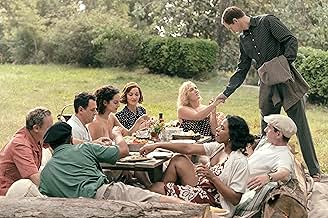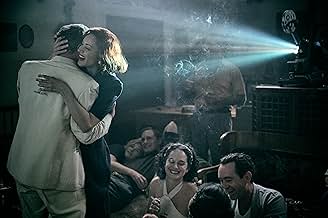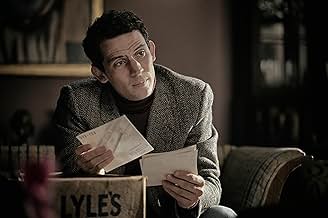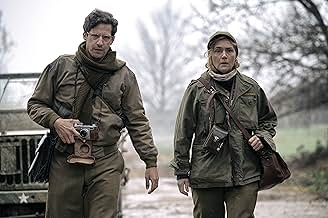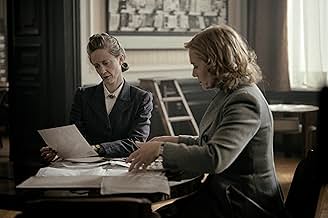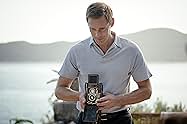La historia de la fotógrafa Elizabeth 'Lee' Miller, una modelo de moda que se convirtió en una aclamada periodista de guerra para la revista Vogue durante la Segunda Guerra Mundial.La historia de la fotógrafa Elizabeth 'Lee' Miller, una modelo de moda que se convirtió en una aclamada periodista de guerra para la revista Vogue durante la Segunda Guerra Mundial.La historia de la fotógrafa Elizabeth 'Lee' Miller, una modelo de moda que se convirtió en una aclamada periodista de guerra para la revista Vogue durante la Segunda Guerra Mundial.
- Dirección
- Guionistas
- Elenco
- Nominada a1 premio BAFTA
- 3 premios ganados y 17 nominaciones en total
Resumen
Reviewers say 'Lee' is a biographical drama about Lee Miller, with Kate Winslet's performance as a standout. Many praise Winslet and the film's depiction of Miller's life. However, some criticize the pacing, script, and direction, finding it slow and lacking emotional depth. The film's handling of historical events receives mixed reactions. The supporting cast is noted, though some feel underutilized. Cinematography and production design are praised, but narrative structure and character development are contentious.
Opiniones destacadas
Have just got home from watching "LEE" at my local Picture House.
Blimey, that was DARK. Well, it isn't all dark, but by the time you get to the last half hour... oooft. Let's just say that "feelgood" isn't a term anyone's ever going to apply to this one.
It's not like I went in unprepared: I'd seen Kate Winslet doing the promotional chat show appearances, and as I am already a great admirer of Lee Miller's photojournalism, I knew the kind of subject matter we'd inevitably be exploring, but still... don't say you haven't been warned. This film presents you with you the hideous fact of Nazi genocide, very convincingly as the revelation it must have been in the moment, without (thankfully) a scrap of sentimentality.
Winslet is magnificent in the title role - as is everyone else, to be honest: there are no shoddy performances to be found - and, speaking as a Rolleiflex TLR user myself, it was clear that she had done her homework viz how to wield that lovely machine convincingly. There were moments when the nit-picky photography pedant in me did query whether some of the interior photos were being taken in such low light that it was unlikely to have left any usable impression on the relatively slow film stock available in the 1940s, but let's not quibble!
It's quite a long movie and events are presented in a simple, linear fashion (via a series of chronological flashbacks) with rather uniform pacing throughout - personally, I would have preferred a bit more variation in pace; your taste may differ.
My only really negative criticism has to do with one, frankly bizarre, piece of casting. The role of Englishman Roland Penrose is given to Swedish star Alexander Skarsgård - whose plucky attempt at an English accent is ...I think "variable" is the kindest word for it. It was hard to tell what part of England he was supposed to be from, or indeed what social class, and there were several moments when he didn't sound any kind of English at all. I had to suspend my disbelief on some pretty strong elastic whenever he opened his mouth. Ah well... go figure!
Blimey, that was DARK. Well, it isn't all dark, but by the time you get to the last half hour... oooft. Let's just say that "feelgood" isn't a term anyone's ever going to apply to this one.
It's not like I went in unprepared: I'd seen Kate Winslet doing the promotional chat show appearances, and as I am already a great admirer of Lee Miller's photojournalism, I knew the kind of subject matter we'd inevitably be exploring, but still... don't say you haven't been warned. This film presents you with you the hideous fact of Nazi genocide, very convincingly as the revelation it must have been in the moment, without (thankfully) a scrap of sentimentality.
Winslet is magnificent in the title role - as is everyone else, to be honest: there are no shoddy performances to be found - and, speaking as a Rolleiflex TLR user myself, it was clear that she had done her homework viz how to wield that lovely machine convincingly. There were moments when the nit-picky photography pedant in me did query whether some of the interior photos were being taken in such low light that it was unlikely to have left any usable impression on the relatively slow film stock available in the 1940s, but let's not quibble!
It's quite a long movie and events are presented in a simple, linear fashion (via a series of chronological flashbacks) with rather uniform pacing throughout - personally, I would have preferred a bit more variation in pace; your taste may differ.
My only really negative criticism has to do with one, frankly bizarre, piece of casting. The role of Englishman Roland Penrose is given to Swedish star Alexander Skarsgård - whose plucky attempt at an English accent is ...I think "variable" is the kindest word for it. It was hard to tell what part of England he was supposed to be from, or indeed what social class, and there were several moments when he didn't sound any kind of English at all. I had to suspend my disbelief on some pretty strong elastic whenever he opened his mouth. Ah well... go figure!
It's a partial biopic of photojournalist Lee Miller (Kate Winslet) set in 1977 with flashbacks to 1938-1945. The film frames its story as an interview of Miller by a young man (Josh O'Connor) in 1977. Sequential flashbacks to Miller's life begin in 1938 and then follow.
Miller is a former American model who has taken up photography as an artistic form and hangs out with an artsy crowd in France, where she has lived for a time. Among her friends are Jean (Patrick Mille) and Solange d'Ayen. She meets Roland Penrose (Alexander Skarsgard), a Quaker artist and poet in Great Britain. He is also part of her artistic community and they begin a relationship. Miller moves to London, where she secures a job with the British Vogue magazine edited by Audrey Withers (Andrea Riseborough).
After World War II begins, Miller finds her way to the front lines as a war photojournalist for Vogue. "Lee" depicts some of her dramatic experiences, which resulted in memorable photographs from battles, the capture of Berlin, and the death camps, often together with a Life magazine photographer, David Scherman (Andy Samberg). Miller's personality throughout is hard-driven and sometimes impulsive as she copes through chain-smoking and alcohol consumption. At the film's end, we learn more about her motivation.
"Lee" is too one-dimensional, though Kate Winslet's strong performance reflects a complex and troubled personality. There are too many characters with shallow development, leaving Winslet on her own. The lack of context also detracts, as her past is vaguely referenced (she was married to an unmentioned man throughout the war), and we learn nothing of her life after the war (she did marry Roland). Thus, "Lee's" limitations derive from how an array of screenwriters made the adaptations from the 1985 biography.
Miller is a former American model who has taken up photography as an artistic form and hangs out with an artsy crowd in France, where she has lived for a time. Among her friends are Jean (Patrick Mille) and Solange d'Ayen. She meets Roland Penrose (Alexander Skarsgard), a Quaker artist and poet in Great Britain. He is also part of her artistic community and they begin a relationship. Miller moves to London, where she secures a job with the British Vogue magazine edited by Audrey Withers (Andrea Riseborough).
After World War II begins, Miller finds her way to the front lines as a war photojournalist for Vogue. "Lee" depicts some of her dramatic experiences, which resulted in memorable photographs from battles, the capture of Berlin, and the death camps, often together with a Life magazine photographer, David Scherman (Andy Samberg). Miller's personality throughout is hard-driven and sometimes impulsive as she copes through chain-smoking and alcohol consumption. At the film's end, we learn more about her motivation.
"Lee" is too one-dimensional, though Kate Winslet's strong performance reflects a complex and troubled personality. There are too many characters with shallow development, leaving Winslet on her own. The lack of context also detracts, as her past is vaguely referenced (she was married to an unmentioned man throughout the war), and we learn nothing of her life after the war (she did marry Roland). Thus, "Lee's" limitations derive from how an array of screenwriters made the adaptations from the 1985 biography.
You have got to admire Kate Winslet for her determination to make a film about Lee Miller, the pioneering photographer who was one of the first to see the nazi death camps and who fought for her right to record history as she saw it, and as a woman. Winslet campaigned for years and was consistently turned down but she did finally achieve her aim, and the resulting film is a pretty good, sometimes very good. Winslet as Lee Miller is excellent, and although initially the film meanders through millers career in the early stages of the war, later, as she gets more involved, it's a much better film, often impressive and insightful and even powerful. Miller is someone worth commemorating, and this is a fine tribute.
Kate Winslet turns in quite an effective performance here as the eponymous photographer who originally arrived in London to be with husband Roland Penrose (Alexander Skarsgård) and to work for the formidable Audrey Withers (Andrea Riseborough) at "Vogue" magazine as a fashion photographer. With the rise of the Nazis seemingly unstoppable throughout continental Europe, Penrose spends more time on the war effort leaving her more and more determined to prove that she is every bit as capable as her male counterparts. Needless to say there's quite a bit of resistance to her participation in combat zones, but thanks to her own perseverance and an alliance with David Scherman (Andy Samberg) she is soon actively involved in wartime photography and by the end is visiting some of the most ghastly sites ever built seeing, at first hand, the truly stomach-churning atrocities left behind by a now defeated war machine that turned large-scale annihilation into an art form. Her story is being relayed from the comfort of her British home in the 1960s to a man whom we assume is just a journalist. Indeed his obvious nervousness and her antipathetic attitude towards him and his task seems to suggest she sees no value in her memories, but as we develop the threads of her life, we begin to sense that something more exists between her and this young man (Josh O'Connor) which quite neatly puts quite a lot of perspective on the choices made by a woman who probably did put career first. Through the characters of Solange (Marion Cotillard) and Nusch (Noémie Merlant) the film also attempts to put a little meat on the bones of the story of those who had to "co-operate" with their new overlords. Some willingly, some less-so and some, well they didn't live to tell. The production and battle scenarios aren't really so effective - maybe just bit too manicured, the script is a little dry and there's maybe just a bit too much of it, but Winslet shows here that she has plenty of capacity to take on a role that it would have been easy to shower with bravado, but instead she brings a more considered charisma to her portrayal of a woman whose bloody-minded courage provided for some of the most significant imagery of the Second World War. Imagery that even now makes your flesh crawl.
I've seen a few review that seem quite dismissive about the scope and importance of Lee. But if you know about the limited freedom of women during this time period you will totally appreciate the audacity and productivity delivered here. Lee was spurned on by personal trauma to do good with her hard fought freedom to operate in a man's world.
Lee has all the period clothing and historical accuracy which is no small feat, while showing the sheer determination it took to achieve access to the final Nazi front of WW2. People back home in the US didn't believe exactly the horrors and certainly not the numbers of the Holocaust. It was the undeniable courageous journey by Lee which brought back the unmistakeable proof and witness of an evil place in history
Knowing that one can't unsee certain such things in person gives one empathy for the cost of doing photo journalism. Many get martyred while doing their work when jailed or taken hostage in authoritarian regimes. But in this case, to have survived seems as permanently affecting a way to finish such an important task.
Lee has all the period clothing and historical accuracy which is no small feat, while showing the sheer determination it took to achieve access to the final Nazi front of WW2. People back home in the US didn't believe exactly the horrors and certainly not the numbers of the Holocaust. It was the undeniable courageous journey by Lee which brought back the unmistakeable proof and witness of an evil place in history
Knowing that one can't unsee certain such things in person gives one empathy for the cost of doing photo journalism. Many get martyred while doing their work when jailed or taken hostage in authoritarian regimes. But in this case, to have survived seems as permanently affecting a way to finish such an important task.
¿Sabías que…?
- TriviaBased on "The Lives of Lee Miller," the only authorized biography of Lee Miller's life, written by her own son, Anthony Penrose, and published in 1985.
- ErroresArinze Kene who plays Major Jonesy is an African American in charge of white troops in 1944. African American soldiers did not see combat until later that year and African American officers would not have been in charge of white troops until after the desegregation of the armed forces in 1948.
- Citas
Lee Miller: [Handing a knife to a girl she has just saved from rape] Next time, cut it off.
- Créditos curiososThe closing credits have some "what happened to" explanations ; and some of Lee's original photos, often alongside the ones which were recreated for the film.
- ConexionesFeatured in The 7PM Project: Episode dated 21 October 2024 (2024)
Selecciones populares
Inicia sesión para calificar y agrega a la lista de videos para obtener recomendaciones personalizadas
- How long is Lee?Con tecnología de Alexa
Detalles
- Fecha de lanzamiento
- Países de origen
- Sitio oficial
- Idiomas
- También se conoce como
- Лі
- Locaciones de filmación
- Productoras
- Ver más créditos de la compañía en IMDbPro
Taquilla
- Total en EE. UU. y Canadá
- USD 2,005,488
- Fin de semana de estreno en EE. UU. y Canadá
- USD 713,255
- 29 sep 2024
- Total a nivel mundial
- USD 24,612,473
- Tiempo de ejecución1 hora 57 minutos
- Color
- Mezcla de sonido
- Relación de aspecto
- 1.85 : 1
Contribuir a esta página
Sugiere una edición o agrega el contenido que falta

Principales brechas de datos
What is the Canadian French language plot outline for Lee (2023)?
Responda






